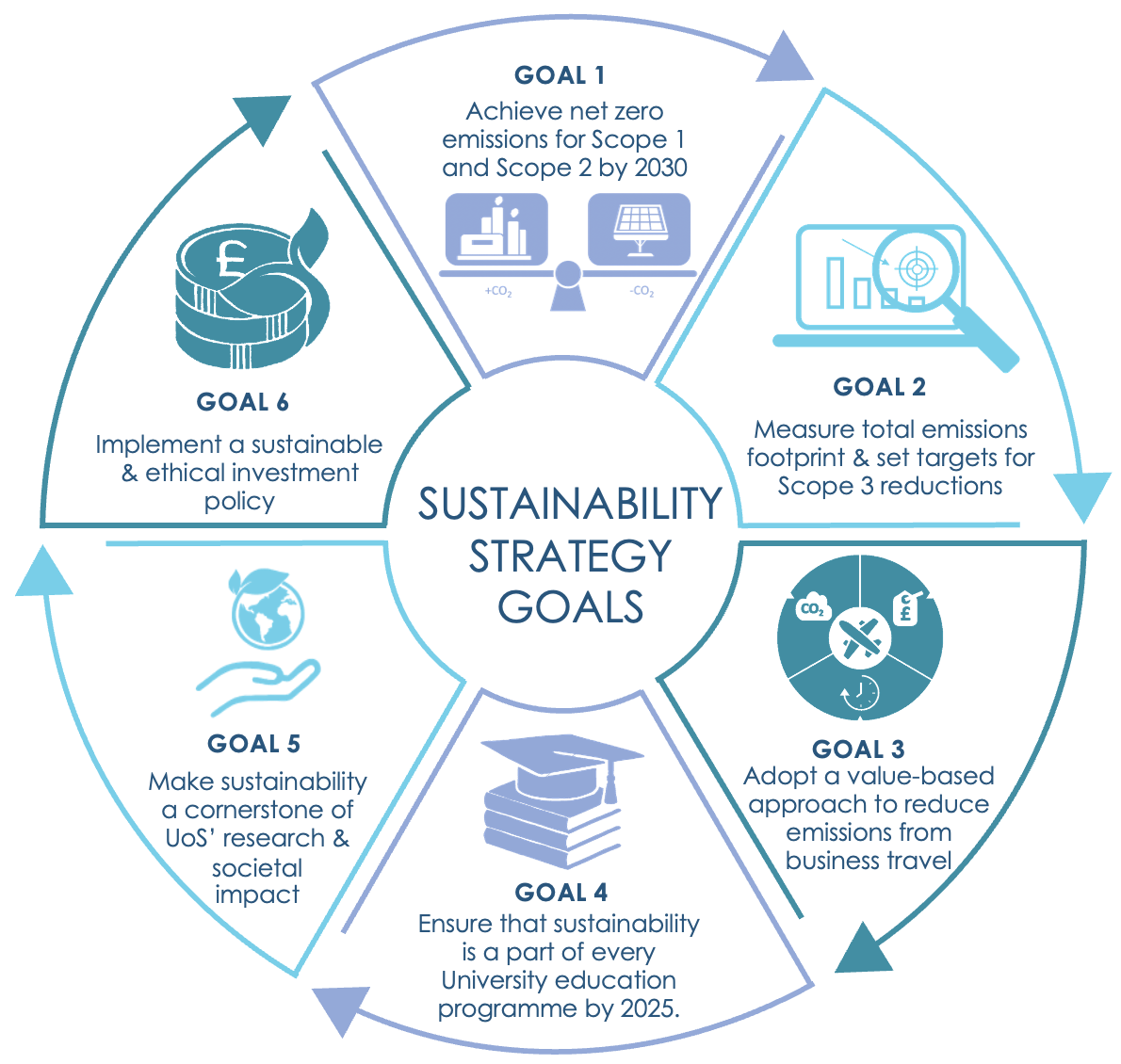SUSTAINABILITY IMPLEMENTATION GROUP
Supporting the University of Southampton’s Strategic Plan
The Energy and Climate Change Division lead on the University Strategic Plan-Sustainability through the University Sustainability Implementation Group (SIG), which is answerable to the Sustainability Strategy Board and UEB. SIG has oversight for the delivery of the Sustainability Programme encompassing six goals, see graphic opposite and below. Each of the six goals has got a Champion (member of UEB) and a lead member of SIG.
The University of Southampton’s Strategic Plan – Sustainability 2020-2025, sets out the ambitious vision for a more sustainable University, with a timeline embedded within an active delivery plan. The vision is that by 2030, sustainability will be a part of everything the University does: including individual behaviours, collaborative working and decision making. This will be key to achieving the University’s mission of changing the world for the better.
This means that by 2030 the University of Southampton wants to have achieved our target of net zero for Scope 1 and 2 emissions, substantially reduced Scope 3 emissions and embedded sustainability into teaching, learning, research, and professional services operations. SIG will strive towards continual improvement in areas such as energy reduction, waste and recycling, water consumption, biodiversity and sustainable transport.
Staff involved, Professor Bahaj, SIG Chair, Dr Anderson, Science & Analysis, Manager (to be appointed), Rahul Jain, Data Analytics, and other support staff.

To deliver on the University’s vision, we have idenitifed the following six goals.
Goal One
Implement emissions reductions and future action planning to ensure we achieve zero emissions for Scope 1 and Scope 2 by 2030.
What we did in 2021 – Switched to renewable electricity saving ~ 11,200 T CO2e emissions per year (~45% of Scope 1 & 2 emissions); developed a ‘Net-Zero by 2030’ roadmap by analysing our highest emissions buildings and future options for the combined heat and power (CHP) plant.
What’s Next? – Implement the roadmap to ensure annual emissions reductions targets are met.
Goal Two
Measure our total emissions footprint and set targets for Scope 3 emissions reductions.
What we did in 2021 – Developed a method to measure our Scope 3 emissions and estimated our total Scope 1, 2 and 3 emissions to be ~ 130,000 T CO2e; developed a framework for Ensuring Strategic Decisions Align with the Sustainability Strategy Goals.
What’s Next? – Set ambitious reduction targets for Scope 3 that will become part of the net zero roadmap; pilot the ‘embedding sustainability’ framework to ensure strategic decisions align with the Sustainability Strategy Goals in business-as-usual settings.
Goal Three
Set and implement a business travel emissions reduction target and implement through an appropriate action plan.
What we did in 2021 – Invested in high-quality online video conferencing technology and trained staff and students to get the most out of it; built an emissions calculator into our booking system to help people choose the most sustainable mode of transport.
What’s Next? – Set a business travel emissions target; implement a communication plan to target highest emitting business travellers; consult on a points system to help people estimate the value of their planned travel; undertake a feasibility study for a university-wide emissions budget for business travel.
Goal Four
Ensure that sustainability is a part of every University education programme by 2025.
What we did in 2021 – Launched a campus-wide ‘Southampton Sustainability Solutions’ e-learning module; mapped the Sustainable Development Goals across all University Curricula, finding that all programme compulsory modules map to at least one SDG.
What’s Next? – Ensure the e-learning module is embedded in all student and staff orientation; develop a UOSM Sustainability module as an option for undergraduate degree programmes; ensure all education programmes have integrated, subject relevant sustainability themes.
Goal Five
Make sustainability a cornerstone of UoS’ research and societal impact.
What we did in 2021 – Mapped all University research outputs and REF Impact Case Studies against the UN Sustainable Development Goals finding that 30% of outputs and all ICS map to at least one SDG.
What’s Next? – Consult on and establish a Sustainability and Resilience Research Hub; co-ordinate the first set of hub-linked research projects.
Goal Six
Implement a sustainable and ethical investment policy.
What we did in 2021 – Reviewed the University’s exposure to fossil fuel investments – 0.8% of our portfolio was held within direct fossil fuel companies and a further 0.8% within indirect fossil fuel companies; developed and implemented a Sustainable and Ethical Investment Policy.
What’s Next? – Developing a transparent process of reporting on our investment decisions; evolving our portfolio to be fully compliant with our Sustainable and Ethical Investment Policy.
The University are committed to publishing their annual Strategic Plan – Sustainability progress. In December 2021, we issued an update covering progress against all six goals. Click here to read the document in full.
